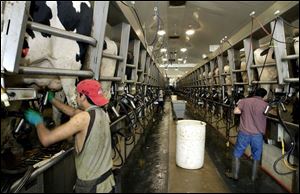
Ohio cows moo-ving to Latino beat
3/28/2004
Workers listen to Latino music in the milking parlor at the Vreba-Hoff Dairy Farm near Hudson, Mich. The type of music that best suits milking has been much debated. Some say it is not the type of music but the volume that matters.
Most Ohio dairy cows listen to country music radio, but increasingly local Holsteins are chewing their cud to Mexican hits.
Latino music has been, well, moo-ving into area milking parlors over the past decade as more large dairy farms employ workers whose first language is Spanish. Now, perhaps up to a third of Ohio cows listen to Latin lyrics while they are being milked, according to Ohio State University dairy scientist Normand St-Pierre.
After decades of debate among farmers, most dairy experts have decided the type of music that cows listen to does not affect milk production. But what kind of music a cow listens to says a lot about the size of farm where she lives, Mr. St-Pierre said.
On farms milking more than 200 cows, Latino music is most common.
On farms with 50 to 200 cows, the local country radio station is usually on, although perhaps a fifth of those cows listen to rock.
And on the smallest farms the only music that cows are likely to hear is German hymns and English Gospel songs - sung live. About a third of Ohio's dairy farms, milking 10 to 15 percent of the state's cows, are owned by Amish or conservative Mennonites who do not have radios or stereos. But some of those families sing together as they milk cows.
Ironically, Dutch music is almost never played for local cows, even though recent immigrants from the Netherlands have built many of the area's largest new dairy farms in the past few years.
Many of those dairies employ Hispanic workers, who typically are assigned to repetitive work in the milking parlor where music is a fixture.
For more than half a century - ever since radios became cheap enough to install in milking parlors - farmers have debated what type of music cows might like best. Some have even attempted to measure whether their cows would produce more milk listening to a certain type of music.
Mr. St-Pierre said scientific method was lacking in most of those studies.
"The type of music is irrelevant," he said. But he is a fan of music in the parlor, feeling it calms the cows.
Consistency, however, is important, he said. Cows are such creatures of habit that changing the radio dial from country to rock could leave cows with an Achy Breaky Heart.
Others say keeping the volume down is all that really matters when it comes to music in the milking parlor.
Jose van Wezel, a partner in Wezbra Dairy LLC in Putnam County, keeps the volume controls to the compact disc player in her office - and when she is not there it is locked.
"A cow is a really sensitive animal; so you want to make everything as relaxed as possible," she said. "It's background music. It's not a disco."
Stephen Vander Hoff, a partner in Vreba-Hoff dairies near Hudson, Mich., removed the volume control knob after installing a nearly $1,000 stereo set-up with marine speakers that are not damaged by water in a large milking parlor.
It was worth the extra cost, he decided, to buy multiple speakers so the music would not be so loud in some areas that it disturbed cows or so soft in other areas that workers could not hear it and would avoid that part of the parlor.
To Mrs. van Wezel, music in the milking parlor is a far bigger benefit to the workers than the cows. She used the promise of playing Latino music in her parlor as an incentive for workers if they met certain goals, which they did.
Tim Demland, an Ohio State University Extension dairy specialist based in northwest Ohio, agrees that music is for the employees, but said that it has a direct bearing on cows' happiness.
"My own personal opinion is it calms the milker so the milker does a better job," he said.
Some farmers and dairy experts take exception to that theory.
One of the largest area farms, Bridgewater Dairy LLC near Montpelier in Williams County, does not allow music in the milking parlor. Partner Leon Weaver said employees don't catch equipment problems as fast as they should when they're listening to music.
And Karel Van de Kolk, who milks 600 cows at Chesterfield Dairy LLC in northern Fulton County, agreed.
"If you have music, you can't hear a thing," he said.
Contact Jane Schmucker at: jschmucker@theblade.com or 419 724-6102.